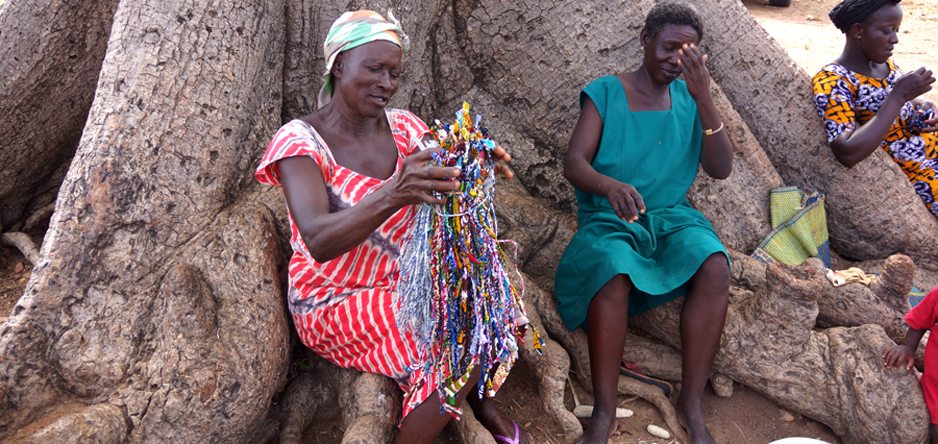G-lish baskets are d-lish!! Just delicious …. These colourful baskets are great companions at the market or just standing around looking gorgeous. Gorgeous handwoven Baskets using recycled materials from Ghana …
Gorgeous handwoven Baskets using recycled materials from Ghana have this to say …..
As a Recycled Bolga Basket from Africa, I should mention that I’m created from over 270 ‘pure water’ plastic bags, and 2 yards of scrap cloth. I was waste, once, but I’m rather striking, don’t you think?? I make a wonderful companion for shopping trips and, for someone special, a unique gift that keeps giving.
The women basket-weavers of Bolga in the Upper East Region of Ghana will be able to send their children to school or buy medicine when you buy me. I may be the difference between an education and no education. That’s because the producers receive above fair trade wages for creating me which helps them ear above minimum wage levels of income.
While visiting Ghana early this spring, we visited G-lish Foundation and Ambrose took us to meet this lovely weaver. You can see how she is incorporating the recycled ‘twisted’ plastic and scrap fabric in with the traditonal straw.
There are the Basket Weavers and the Twisters. The Twisters are the women who ‘twist’ the plastic and scrap fabric so they are ready for the weavers to incorporate them into their baskets.
I was so impressed by this innovative Basket design. The basket is created using traditional methods but also using unique materials creating one-of-a-kind baskets that have a big social impact. From their website g-lishfoundation.myshopify.com I copied this info for you.
“G-lish collects plastic rubbish and scrap African cloth and trains youth and women to transform those materials into twine (“Twisters”). Skilled basket weavers weave the plastic and cloth twine into baskets, home-wares and art work using traditional weaving methods—thus preserving cultural heritage while helping alleviate poverty and tackling entrenched and overlooked environmental waste problems.
Since 2010 G-lish Foundation has achieved the following impacts:
Environmental Impact
- Prevented 358, 600 drinking water plastic bags from being burned and from entering rivers and farming soil by recycling them into high value products;
- Because we pay producers by the 200 pieces of twine cut and twisted, and we record every payment on paper and in an Excel spreadsheet, and because 1 plastic bag = 1 twine, it’s simple to tally how many plastic bags have been used since 2010 and easy to track this impact;
- Prevented 2, 250 yards of waste cloth from being burned or thrown into rivers;
- = Over 3 metric tonnes of recycled waste materials;
- Trained 81 producers on how to work with recycled materials.
Social and Economic Impact
- Two full-time Ghanaian staff have been employed;
- 81 producers, who otherwise undertake subsistence farming, work with G-lish Foundation and are paid prices in line with Fair Wage Guide rates for Ghana at http://fairwageguide.org/;
- Helped 75 producers access foreign markets generating higher income for producers;
- Instances of violence have reduced due to regular incomes in basket making households;
- Visibly increased self confidence in the women producers;
- As a result of counseling and working with producers, children in G-lish villages are in school;
- 25 producers opened savings account with rural banks and save regularly;
- 25 weavers received design and colour theory training to develop their design skills;
- 250 straw basket weavers have increased awareness about fair prices from 6 village field visits under the Fair Market Project funded by the Australian High Commission;
- 50 international buyers of straw baskets were surveyed on prices paid for STRAW baskets.”




